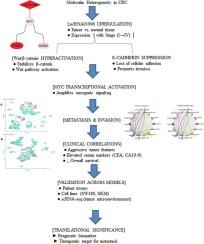Single-cell transcriptomics exposes an uncharacterized lncRNA governing colorectal cancer metastasis
IF 0.7
Q4 GENETICS & HEREDITY
引用次数: 0
Abstract
Colorectal cancer (CRC) exhibits significant molecular heterogeneity, with long non-coding RNAs (lncRNAs) playing crucial regulatory roles. This study identifies LncRNA01996 as a key oncogenic driver upregulated in CRC tumors compared to adjacent normal tissues, with expression levels correlating directly with advancing cancer stage (Stage I to IV). Mechanistically, LncRNA01996 stabilizes β-catenin, hyperactivating the Wnt signaling pathway while simultaneously suppressing E-CADHERIN expression a critical factor in maintaining cellular adhesion. This dual action promotes cancer cell invasion and metastasis. Additionally, LncRNA01996 transcriptionally activates MYC, amplifying its oncogenic effects.
Clinically, high LncRNA01996 expression is linked to aggressive tumor features, elevated serum markers (CEA, CA19–9), and shorter overall survival in patients. These findings were consistent across patient tissues, cell lines (SW480, SKM), and single-cell RNA sequencing data, confirming its role in diverse CRC microenvironments.
In summary, LncRNA01996 drives CRC progression by dysregulating Wnt/β-catenin signaling, disrupting cell adhesion, and amplifying MYC-driven malignancy. Its strong association with advanced disease and poor outcomes positions LncRNA01996 as a promising prognostic biomarker and a compelling therapeutic target for intercepting CRC metastasis.

单细胞转录组学揭示了一种未表征的lncRNA控制结直肠癌转移
结直肠癌(CRC)表现出明显的分子异质性,其中长链非编码rna (lncRNAs)发挥着至关重要的调控作用。本研究确定LncRNA01996是CRC肿瘤中与邻近正常组织相比上调的关键致癌驱动因子,其表达水平与癌症进展(I期至IV期)直接相关。从机制上讲,LncRNA01996稳定β-catenin,过度激活Wnt信号通路,同时抑制E-CADHERIN的表达,这是维持细胞粘附的关键因素。这种双重作用促进了癌细胞的侵袭和转移。此外,LncRNA01996转录激活MYC,放大其致癌作用。在临床上,LncRNA01996的高表达与侵袭性肿瘤特征、血清标志物(CEA、CA19-9)升高和患者总生存期缩短有关。这些发现在患者组织、细胞系(SW480、SKM)和单细胞RNA测序数据中是一致的,证实了其在不同CRC微环境中的作用。总之,LncRNA01996通过失调Wnt/β-catenin信号、破坏细胞粘附和放大myc驱动的恶性肿瘤来驱动结直肠癌的进展。LncRNA01996与晚期疾病和不良预后的强烈关联使其成为一种有前景的预后生物标志物和阻断结直肠癌转移的令人信服的治疗靶点。
本文章由计算机程序翻译,如有差异,请以英文原文为准。
求助全文
约1分钟内获得全文
求助全文
来源期刊

Human Gene
Biochemistry, Genetics and Molecular Biology (General), Genetics
CiteScore
1.60
自引率
0.00%
发文量
0
审稿时长
54 days
 求助内容:
求助内容: 应助结果提醒方式:
应助结果提醒方式:


